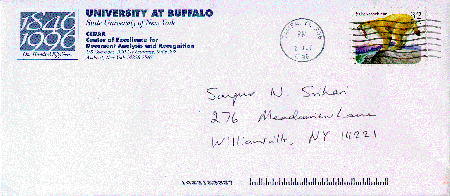Handwritten address interpretation research began at CEDAR in 1987 through funding from the United States Postal Service (USPS). The objective was to automate mail sorting through a system that could read a handwritten street address and ZIP code and encode each envelope with the destination address for machine sorting.
This research ultimately led to the development and deployment of system that automates mail sorting through image analysis, digit recognition, word recognition, postal directory lookup, and a barcode assignment that designates the destination address. Since field-testing began in 1996, the Handwritten Address Interpretation System (HWAI) has been implemented at all USPS mail processing centers.
Handwritten address interpretation technology has also been developed for address recognition systems for the United Kingdom's Royal Mail and the Australia Post.
